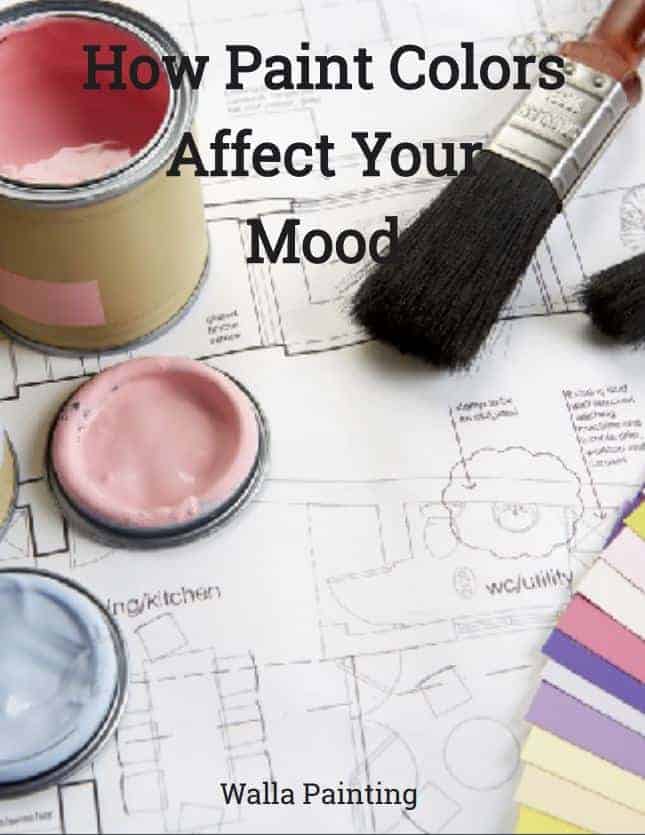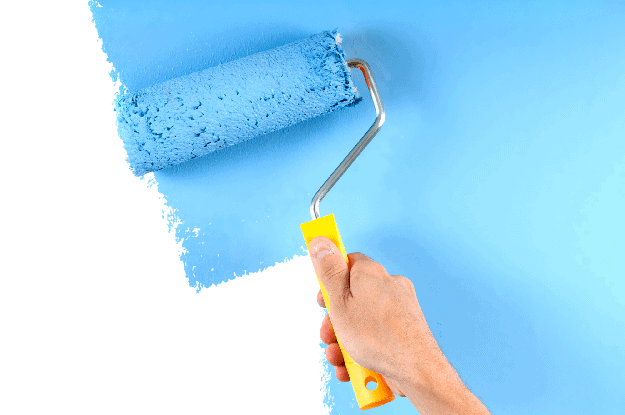How Paint Colors Affect Your Mood
There are virtually thousands of choices when it comes to painting the interior of your home. Personal preference, existing color schemes of furniture and art and room function can all play into the color selection. Another very important factor is to make sure the paint color you choose will not adversely affect your mood.
It’s a scientific fact that color affects mood. Certain hues will make us feel more energetic, or they can be calming. Some even produce feelings of aggression or depression. The types of emotional triggers are caused by the saturation, or purity of the color, as well as its brightness level. For example, a wall painted with a low saturation color like bright green will induce a calm, relaxed feeling. A more saturated but more muted sapphire blue color can make you feel energized.

Cool vs. Warm Colors
You may remember this from grade school, but all colors fall into two basic categories, warm and cool.
Warm colors are associated with sunlight and heat. They create a warm, lively, energetic and inviting space. The three basic warm colors include:
- Red
- Yellow
- Orange
Cool colors relate to nature, like water, sky and plants. They generate a calm and relaxing mood. These basic cool colors are:
- Blue
- Green
- Violet or Purple
Of course, there are hundreds of variations within each of these basic colors. And there are also the extremes like white and black. Let’s look at each basic color and how it affects the mood and emotions. Choosing the right shade for the room you’re painting will enhance the mood you’re wanting to achieve.

Red will increase the energy level, as it is an intense color that gets the adrenaline going. When you paint a room with a red tone, you will stir up feelings of excitement. It is stimulating and encourages discussions among people. Some great places to use red paint tones are:
- An entryway, to create a strong first impression
- Spaces for entertaining, like great rooms, finished basements, dens and the like
- Dining rooms
- Kitchens (if you want to add some spark)
- Because red tones tend to raise blood pressure and heart rate, they aren’t necessarily recommended for bedrooms or other rooms where relaxation and rest are the priority.
Yellow is associated with sunshine, so it generates feelings of warmth and happiness, like on a bright summer day. Soft shades of yellow can make a room cheery and uplifting. If you paint a room a brighter yellow, it may convey negative emotions, like anger or frustration. Where yellow works well:
- Kitchens
- Bathrooms
- Dining areas
Be cautious when using bright yellow in baby nurseries and bedrooms because of the negative emotions it can generate. If you want a yellow room, select a lighter shade of yellow, or combine a small amount of bright yellow with other colors to lessen the negative effects.
Orange is a blend of red and yellow, so it has some traits of both. It can generate energy and enthusiasm like red, but can be warm and inviting, like yellow. This makes orange a good color for the rooms listed above for those colors. It can also be a great option for a gym or exercise room.

Blue is a color that evokes feelings of tranquility. Just picture gazing at the blue sky, being near an ocean or lake—don’t you get calmer just thinking about it? Blue tends to slow respiration, heart rate and lower blood pressure. Take caution, however, as the darker shades of blue may trigger sadness and depression. Areas where blue works well are:
- Bedrooms
- Bathrooms
- Offices
- Spas
Green shades are abundant in nature, so it evokes feelings of renewal and growth. Since the color green is derived by mixing blue and yellow, it generates the cheeriness of yellow and the calming and tranquil effects of blue. Suggestions for rooms to paint green are:
- Bedrooms
- Bathrooms
- Family rooms
- Spa rooms
- Screened porches
Violet is a combination of blue and red. Since these are both cool and warm colors, the emotions it generates depend on the particular shade of purple. Lighter shades like lavender will make the room more tranquil and can work great in bedrooms and other rooms where you want to encourage relaxation. Darker shades will work like red, energizing the room, so use them in rooms where active conversation and activity is desired. Some of the darker purple colors can also be associated with royalty, so rooms in those shades will appear more luxurious.

White reflects purity, cleanliness and wholesomeness. Rooms painted entirely white can create feelings of anxiety. To minimize the negative emotions, choose an off-white shade, or mix it with other colors to offset the stark appearance.
- Black can be depressing if it encompasses the entire room. Painting one wall or trim can add sophistication and make a room more relaxing.
- Grey is actually the new beige in the world of paint colors. It has warm undertones to make a living space more comfortable and inviting.
Set the Right Mood with the Right Color
Walla Painting can help you decide what color is right for the room you need painted. Once you select the colors, our experts will apply the paint quickly and efficiently.
Contact us today to receive a free quote for your next residential painting project.